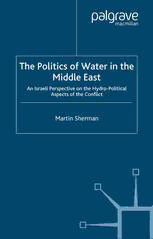
The Politics of Water in the Middle East: An Israeli Perspective on the Hydro-Political Aspects of the Conflict PDF
Preview The Politics of Water in the Middle East: An Israeli Perspective on the Hydro-Political Aspects of the Conflict
The Politics of Water in the Middle East An Israeli Perspective on the Hydro-Political Aspects of the Conflict Martin Sherman THE POLITICS OF WATER IN THE MIDDLE EAST Also by Martin Sherman and from the same publishers DESPOTS,DEMOCRATSANDTHEDETERMINANTSOF INTERNATIONALCONFLICT The Politics of Water in the Middle East An Israeli Perspective on the Hydro-Political Aspects of the Conflict Martin Sherman Department of Political Science University of Tel Aviv Israel First published in Great Britain 1999 by MACMILLAN PRESS LTD Houndmills, Basingstoke, HampshireRG21 6XS and London Companies and representatives throughout the world A catalogue record for this book is available from the British Library. ISBN 978-1-349-40812-2 ISBN 978-0-333-98370-6 (eBook) DOI 10.1057/978-0-333-98370-6 First published in the United States of America 1999 by ST. MARTIN’S PRESS, INC., Scholarly and ReferenceDivision, 175FifthAvenue,New York, N.Y. 10010 ISBN 978-0-312-21683-2 Library of CongressCataloging-in-PublicationData Sherman,Martin, 1947– The politics of water in the MiddleEast : an Israeli perspective on the hydro-political aspects of the conflict / Martin Sherman. p. cm. Includes bibliographical references and index. ISBN 978-0-312-21683-2 (cloth) 1.Water-supply—Political aspects—Israel. 2.Water resources development—Political aspects—Israel. 3.Water-supply—Political aspects—MiddleEast. 4.Water resources development—Political aspects—MiddleEast. 5.Arab–Israeli conflict. I.Title. HD1698.I75S53 1998 333.91'0095694—dc21 98–30267 CIP ©MartinSherman 1999 Softcover reprint of the hardcover 1st edition 1999 978-0-333-73483-4 All rights reserved. No reproduction, copy or transmission of this publication may be made without written permission. No paragraph of this publication may be reproduced, copied or transmitted save with written permission or in accordance with the provisions of the Copyright, Designs and PatentsAct 1988, or under the terms of any licence permitting limited copying issued by theCopyrightLicensingAgency, 90 TottenhamCourtRoad,LondonW1P 9HE. Any person who does any unauthorised act in relation to this publication may be liable to criminal prosecution and civil claims for damages. The author has asserted his right to be identified as the author of this work in accordance with the Copyright,Designs and PatentsAct 1988. This book is printed on paper suitable for recycling and made from fully managed and sustained forest sources. 10 9 8 7 6 5 4 3 2 1 08 07 06 05 04 03 02 01 00 99 Contents List of Figures, Tables, Maps and Exhibits vii Acknowledgements ix Introduction xi 1 Water: a Vital and Scarce Strategic Resource 1 2 Supply and Demand for Water in Israel 7 3 The Dual Menace to Israel’s Water Resources: Deteriorating Quantity and Quality 14 4 The Waters of the Mountain Aquifer: An Inevitable Source of Conflict 20 5 The Kinneret: A Vital, Volatile and Vulnerable Water Source 33 6 Middle Eastern Realities: Stable Geology and Volatile Politics 42 7 Will Water Quench or Fuel the Flames of Animosity? 48 8 Arab Recriminations: Separating Fact from Fabrication 58 9 Resolving Conflict over Water: Separating Fact from Fantasy 67 10 The Hydro-Political Significance of the Oslo Accords and ‘Peace Process’: Policy Options and Imperatives 93 Appendices 1: The Israeli–Palestinian Interim Agreement on the West Bank and the Gaza Strip, Annex III, Article II, Appendix 1, Article 40, Water and Sewage 114 2: Treaty of Peace Between the State of Israel and the Hashemite Kingdom of Jordan, 26 October 1994, Article 6, Water 123 3: Text of Publications by Israeli Ministry of Agriculture Relating to Hydro-Political Issues 128 v vi Contents Notes and References 135 Bibliography 149 Index 155 List of Figures, Maps, Tables and Exhibits Figures A The conceptual structure of the book xiv 1.1(a) Non-agricultural water consumption (cum per capita) 5 1.1(b) Annual domestic per capita water consumption 5 4.1 Schematic representation of the salinization process in the Mountain Aquifer – I 22 4.2 Schematic representation of the salinization process in the Mountain Aquifer – II 23 5.1 Average chloride concentration in the Kinneret (Sea of Galilee) 40 7.1 Subterranean flow and discharge of Mountain Aquifer 50 7.2 Saline intrusions underlying the Mountain Aquifer 56 8.1 Arab and Jewish water sources in the Ouja area – schematic representation 65 Maps 2.1 Major water sources of Israel 8 2.2 The National Water Carrier and some related distribution systems 11 5.1 The Kinneret drainage area 35 5.2 Attempted Syrian diversion of Upper Jordan sources 37 9.1 Proposed ‘Med–Dead’ and ‘Red–Dead’ canal routes 69 9.2 Proposed ‘Peace Pipeline’ route 72 10.1 Approximate demarcation of vital hydrostrategic areas as determined by the TAHAL Report 97 vii viii List of Figures, Maps, Tables and Exhibits Tables 4.1 The conflicting Israeli and Palestinian positions on the water issue 27 8.1 Annual allocation of water to agriculture in Israel (mcm) 62 8.2 Palestinian domestic water consumption 1966–79 63 9.1 GNP per capita in the Middle East 89 Exhibits 10.1 ‘Not a single drop’ – A’Thawra, 18.4.93 106 10.2 ‘Not a drop’ – Al Ahram, 23.5.92 107 Acknowledgements I am greatly indebted to Shmuel Kantor and Yehoshua Schwartz for the time and attention they devoted to me. My thanks are also due to Menahem Kantor, Nurit Kliot, Arnon Soffer and Dan Zaslavsky for their assistance and counsel. I should also like to express my gratitude to Barry Brisman, Lesley Terris and Keith Povey for their valuable advice in the proof reading and editing of this volume. MARTINSHERMAN ix
